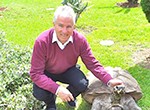 A few months before the 2004 UEFA European Football Championship, we moved to the sports mad north west of England, where you could taste the anticipation. St George’s flags hung from houses, work rotas were switched to catch the live matches on TV, and we put on a street barbeque for England’s first match. Bunting was dusted off, faces were painted (not just the children’s), and England—having led 1-0 for most of the match—conceded twice to the French in injury time. Supporting the English football team is a metaphor for life: long periods of low grade misery punctuated by brief—but only brief—periods of happiness. It was still a great party.
A few months before the 2004 UEFA European Football Championship, we moved to the sports mad north west of England, where you could taste the anticipation. St George’s flags hung from houses, work rotas were switched to catch the live matches on TV, and we put on a street barbeque for England’s first match. Bunting was dusted off, faces were painted (not just the children’s), and England—having led 1-0 for most of the match—conceded twice to the French in injury time. Supporting the English football team is a metaphor for life: long periods of low grade misery punctuated by brief—but only brief—periods of happiness. It was still a great party.
Ten years on and nobody is getting excited about England’s chances in the World Cup in Rio in June. I once heard a consultant surgeon say “Good luck, you’re going to need it” to a colleague who was changing into scrubs before failing to achieve an emergency repair of a ruptured aortic abdominal aneurysm. A shiver ran down my spine when the same words, in the same “we’re doomed” tone, were the conclusion of the manager of the Danish football team after playing England last month.
I’ve had more conversations about the appointment of psychologist Dr Steve Peters to work with the England players in the lead up to Rio than about the football itself. Dr Peters has an impressive CV in sports psychology, and his book majors on the irrational and impulsive being that inhabits our minds—the Inner Chimp. There isn’t space to do it justice here, but the core of the approach is that understanding our own emotions is the first step to managing them, and that with practice this leads to greater control, focus, and confidence.
Psychobabble, isn’t it? Where’s the evidence? Well, our fast intuitive approach to decision making, along with the slower rational one, are described in 40 years of research into behavioural economics and cognitive psychology. Daniel Kahneman and Herbert Simon both won Nobel prizes for their work, which has revolutionised and energised the study of decision making behaviour. If there are a couple of Nobel prizes given for this, maybe we should pay it a little attention?
There are a few of us medics who think we might have missed out on something important here. What doctors are all about is making decisions. It seems sensible that people who are expected to be able to make great decisions know a little about how they—and others—make them; yet few healthcare professionals get any formal insights into decision making. Mainly we just hope people catch on how to avoid the pitfalls by osmosis. Think about it (pun intended).
The England and Liverpool captain Steven Gerrard certainly buys into the concept of metacognition. “He can’t help you do a Cruyff turn or a 40 yard pass better, but he can help you learn what goes off inside your head.” Couldn’t have put it better, my son. Anyone for a barbeque?
Neal Maskrey’s early career was as a GP before spending seven years as a medical manager and part time GP. After twelve years as a director of the National Prescribing Centre and programme director at NICE, he is now honorary professor of evidence-informed decision making at Keele University, and consultant clinical adviser in the Medicines and Prescribing Centre, NICE.
Competing interests: I declare that I have read and understood the BMJ Group policy on declaration of interests and I hereby declare the following interests: Employed part time by the National Institute for Health and Care Excellence.
